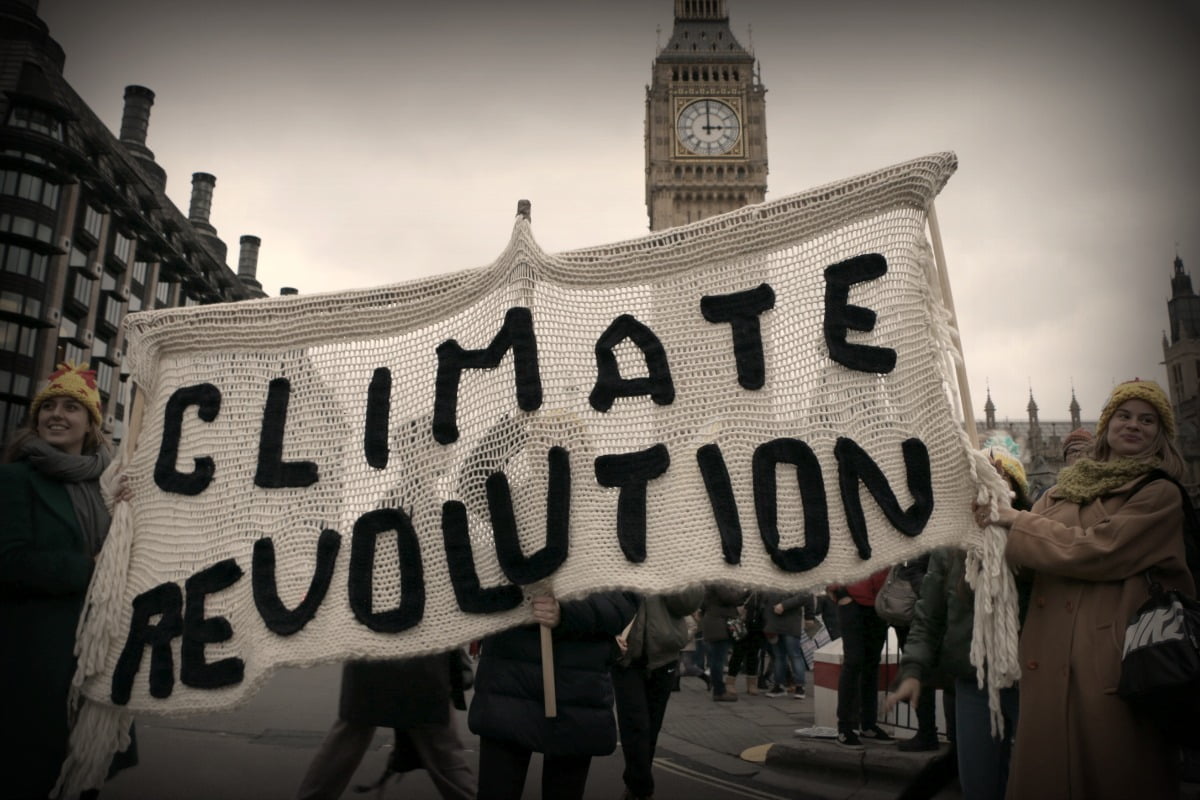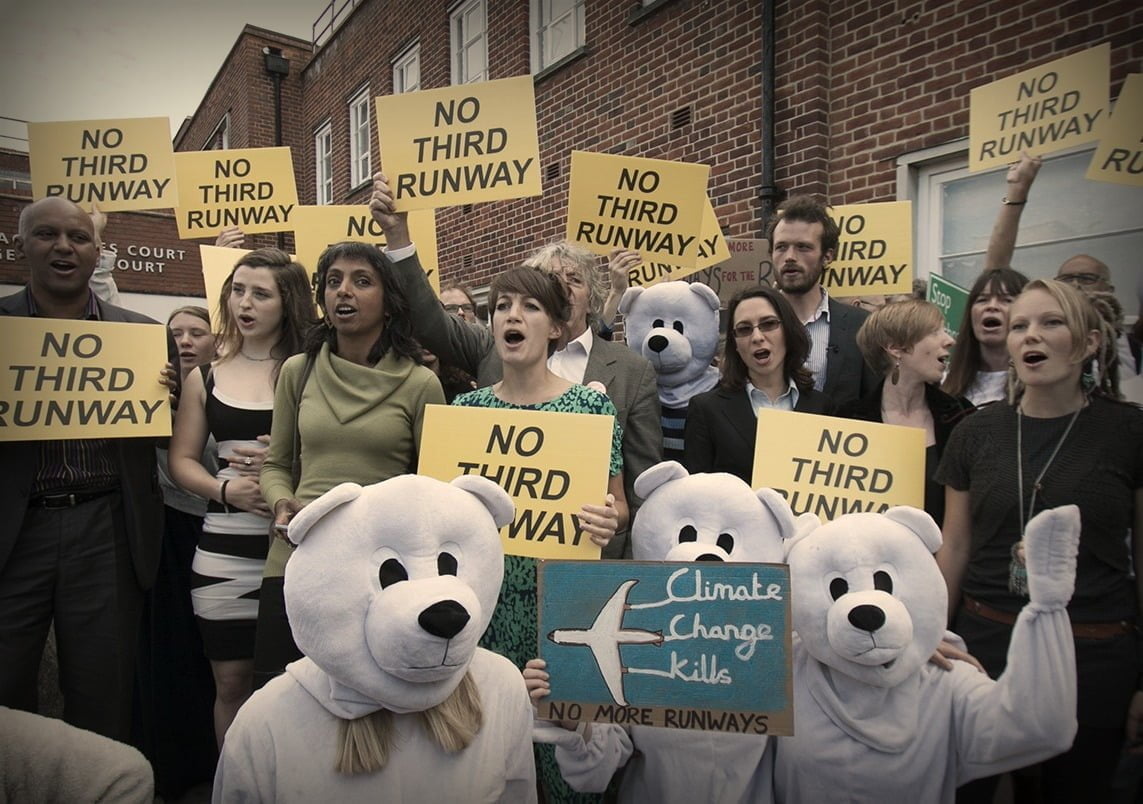“Climate change is the real injustice.” These words were taken from the statement of the ‘Heathrow 13’, a group of environmental activists arrested for closing down a runway at Heathrow airport. Jack Halinski-Fitzpatrick discusses the revolutionary action needed to stop climate change.
Clearly, none of us would choose to go to jail, but this shouldn’t be singled out as the main ‘injustice’. Climate change is the real injustice.
These words were taken from the statement of a group of people who have become known as the ‘Heathrow 13’. This brave collection of men and women, with ages ranging from 28 to 67, were more than willing to give up their own liberty for a cause they believed in – chaining themselves together on Heathrow’s northern runway to protest against the building of a third runway and also against government inaction regarding climate change as a whole.
In January this year, the group were told by judge Deborah Wright that it would be ‘almost inevitable’ that they would receive jail sentences. According to the barrister who represented a number of the group, this would have made them the first people to go to prison for an environmental protest since 1932. However, after a campaign involving the Shadow Chancellor John McDonnell, Green Party MP Caroline Lucas, and many other high profile figures, the group ultimately received six-week suspended jail sentences and community service.
Uncertainty of the ruling class
The vacillating decision making of the judge is reflective of the uncertainty across the ruling class as a whole in this epoch, where the system demands attacks against the living conditions of the 99% and the planet we rely on; and yet these same actions are provoking an equal and opposite reaction on the part of workers and youth.
The initial promised punishment would have been just another example of the increasing tendency towards criminalising protest, confirming what many are quickly coming to understand in this period of heightened class struggle: that the Law and the State are not impartial mediators between equal actors.
As Engels noted in his famous work on The Origins of the Family, Private Property and the State, “since the state arose from the need to keep class antagonisms in check, but also arose in the thick of the fight between the classes, it is normally the state of the most powerful, economically ruling class, which by its means becomes also the politically ruling class, and so acquires new means of holding down and exploiting the oppressed class.”
Anyone who doubts the class nature of the State and the Law under capitalism would do well to look at how punishments are generally reflective of the level of threat that a crime poses to the system of private property, rather than how morally bad the crime itself is.
For example, in 2011, a student with no criminal record was jailed for six months for stealing a bottle of water worth £3.50 during the London riots. In the same year, Elliot Morley MP, who fraudulently claimed £32,000 worth of parliamentary expenses over the course of two years, served only four months of a 16-month jail sentence. So, a naïve young man who gets caught up in the moment and quickly admits his crime gets a similar jail sentence to another man, who systematically cheats the public out of an amount of money that many in this country are paid as a wage for the entire year.
How is this possible? A report by the London School of Economics and the Guardian called Reading the Riots highlighted that the main reason given for rioting by those involved was ‘poverty’, and also that 81% thought that the rioting would happen again. The London rioters were therefore, in effect, treated to the modern form of the stocks, held up as an example to other members of the rabble as to what happens to those who dare to complain about their situation.
In the case of the Heathrow 13, however, the judge seemed to change her mind and suspend the sentence. One of the protestors, in a video created for the Guardian argued that a prison sentence “would make everything flare up”. The change of mind on punishment does, therefore, seem to signal an acknowledgement on the part of the Establishment of the seething anger bubbling under the surface of society, which can ultimately be traced back to the crisis of capitalism – the system that the ruling class defends.
Direct action
Andrew Simms, writing in the Guardian, reported that in the trial, evidence was presented showing that “halting a flight may be the most significant individual action capable of reducing emissions”. However, all that this action achieved, ultimately, was the cancellation of 25 flights.
Whilst this action itself won’t change anything fundamentally, it does reveal an element of revolutionary instinct – a desire to put an end to the status quo of capitalist-caused climate change. This was clearly indicated by one protestor, named Danni Paffard, who was quoted as saying that “watching those in power continue to favour vested interests over the truth is what drives people to stop arguing and start taking direct action”.
Paffard also pointed out that direct action is often necessary due to democracy ‘so rarely’ working. Marxists would certainly agree that democracy under capitalism – which Marx described as “deciding once in three or six years which member of the ruling class is to represent and repress the people in parliament” – is no real democracy at all; nor would we rule out the use of any means in the fight for socialism.
But the only standard by which we can judge the use of these means, ultimately, must be whether they raise political consciousness, unite the working class, and drive society further towards the goal of socialist revolution. Marxists, therefore, are in favour of direct action –not the action of a small group of activists, however, but the mass direct action of the working class, organised and united.
When discussing revolutionary tactics, Leon Trotsky, the great Russian revolutionary, explicitly warned against what he described as a “purely mechanical reaction”, which is “very striking in its outward form…but absolutely harmless as far as the social system goes”. He pointed out that since “all the indignities to which the human body and spirit are subjected” are “the twisted outgrowths and expressions of the existing social system” the task of those who truly want to change the world is to “direct all our energies into a collective struggle against this system”.
The Heathrow 13’s protest, therefore, whilst clearly representing honest and well intentioned anger at the injustices of our society, represents only an impotent outburst of rage –and, at the same time, has the added danger of alienating others who might otherwise have sympathy with the overall aim of abolishing such injustices.

Fight for a socialist alternative!
It is clear, moreover, that the answer for the environmental question cannot be found under capitalism. Ultimately, capitalism is a system of production where a small section of society – the owners of capital; of wealth and technology – get to make all the real decisions about how the world is run, choosing where investment goes not on the basis of society’s needs, but in order to make the greatest profit.
Decision making under capitalism, therefore, takes place anarchically, empirically, and undemocratically. It is not up to the majority what is produced and where wealth is invested. Rather, wealth is solely invested where it is deemed profitable to invest it.
An IPCC (Intergovernmental Panel on Climate Change) report of two years ago pointed out that $147 billion would need to be invested every year until 2030 in renewable energy. However, this is at a time of huge global excess capacity – i.e. overproduction – where the price of oil is falling. If it is not profitable to invest in green technologies and renewable energy sources, then capitalists will not invest.
The hesitancy to invest is not, however, due to a lack of money in the pockets of capitalists, with an estimated $2 trillion sitting idly in the banks of big businesses in the USA alone. It is clear, then, that the issue of climate change – and the inability of the current political leaders to solve it – represents an “expression of the existing social system”. What is required, therefore, is for environmental groups like the Heathrow 13 to link up their struggle with the wider movement in the struggle for a socialist alternative to capitalism.
The demand must be for a democratically planned economy, where the majority of people can decide, on the basis of scientific evidence and the needs of society, what is produced and how it is produced. This, however, is only possible if the economy is in the hands of the working class. You cannot control what you don’t own – and so the demand must be made for the expropriation, without compensation, of the major multinationals, fossil fuel companies, and financial houses. Only in this way can we investment in the technologies and solutions needed to put an end to the environmental destruction caused by capitalism.






